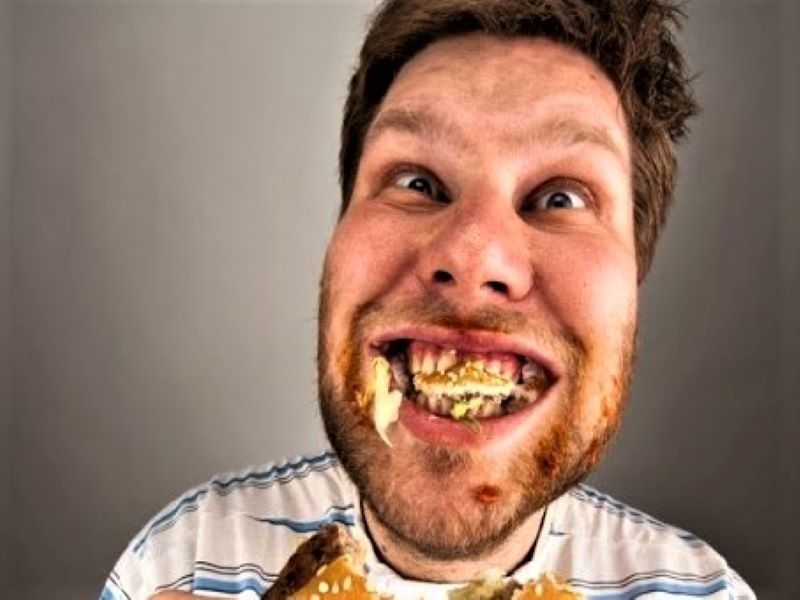Chewing with your mouth open.
Unfortunately, there's no medical exemption. The Western world considers it rude no matter what the reason. It makes no difference if you're simply doing it because you're used to breathing with your mouth to get air!
Here's a commentary on the matter from famous etiquette columnist Emily Post:
"Unquestionably, one of the worst table manners faux pas is to chew with your mouth open. It’s disgusting. I once asked a group of women: On a first date, if a man chewed with his mouth open, would he get a second date? Unanimously and quite vociferously, they responded, 'No way!’ It’s a 'deal breaker'."
"There are lots of mistakes you can make at a dinner table and people will shrug them off, such as using the wrong fork. But chew with your mouth open and people won’t want to eat with you again...and they may decide not to select you for that important client-facing job or to work with you. "
The only statement of compassion from Post came when she acknowledged it might not be intentional. "Many people aren’t even aware that they’re doing it. One way to see yourself as others see you is to eat a meal in front of a mirror."
That's pretty much what happened with me. I was almost 50, teaching my Healthy Breathing Habits class and breathing with my nose regularly -- even proudly while getting my teeth cleaned -- when I realized one day that I chewed with my mouth wide open.
At the time, I was preparing to teach my first children's class and was going over some written instructions on how to chew and swallow with the lips sealed. I discovered it did not come naturally.
Oh no! I was one of "those people". My asthma had started when I was 4, and presumably I had been eating this way from that age or younger.
Then I recognized that my mom and my daughter also ate with their mouths open. We represented three generations of mouth breathers, and I hadn't even noticed because that's just the way we ate in our family.
I wondered why nobody had ever said anything, besides my first boss after college who mentioned obliquely that we had to work on "refining" me. I wasn't sure exactly what she meant, and my feelings were already hurt, so I didn't follow up to clarify...
So here I was, a mature adult, embarking on learning to breathe well as a healthy child would. I started doing the kids' practices myself.
I came to learn pretty quickly that if I were going to chew and swallow efficiently with my mouth closed in the timeframe of one breath, I really needed to start taking smaller bites. No more huge masses of pizza or salad hanging out of my mouth!
Here are some steps you can take to approach stopping chewing with your mouth open!
- Become a nasal breather. If you're a mouth breather, start progressively breathing less through your mouth intentionally until your breathing volume is reduced to the point that your nostrils can take over most of the time.
- Don't read or watch TV when you eat. Put your full attention on what you are doing.
- Take smaller bites of food that fit completely in your mouth..
- For the first five to 10 minutes of every meal, chew each bite 15-20 times with your mouth closed until the food turns to mush so it's easy to swallow, and then swallow those bites with your mouth still purposely closed.
- As a next step, when you swallow with your mouth closed, keep your teeth touching and your face muscles still. The swallowing happens in the throat.
- If this feels impossible, get an assessment of your mouth and airway from a new type of professional called a myofunctional therapist. They're typically associated with dental offices. You may need to build up some throat or mouth muscles, or explore whether there is a physical obstruction.
This is an activity that can be shared with the whole family around the meal table.
Like many other breathing-retraining exercises, the idea is to practice something for a short period regularly, so it gets incorporated into your routines and muscle memory to become a new-normal habit.
Breathing Retraining Center offers individual and group training and coaching on self-management techniques to identify and correct poor-breathing habits. Breathing Retraining Center's educational products, courses and coaching are designed to improve breathing skills for people whose issues may be related to habits that have the potential to be improved, as a self-care/wellness activity. Breathing difficulty may be a warning sign of a life-treatening heart or lung condition, infection or other illness. Always check with your doctor about your own situation.
The Buteyko Breathing Technique and other breathing-retraining strategies we teach are an alternative approach and are not the practice of medicine, psychology or a form of psychotherapy, nor are they a substitute for seeking medical or psychological advice from an apporpriate professional health-care provider. We want to make the important distinction between using the Buteyko Breathing Technique and other breathing-retraining strategies for health and well-being and the practice of medicine, psychology or any other licensed health-care profession.
Breathing classes, coaching and other services from Breathing Retraining Center are offered by teachers who are not licensed by the State of California as physicians or other healing-arts practitioners unless so noted. We offer alternative non-medical/non-psychological techniques and our services are considered to be laternative or complementary to the healing arts that are licensed by the State of California.
.png)
